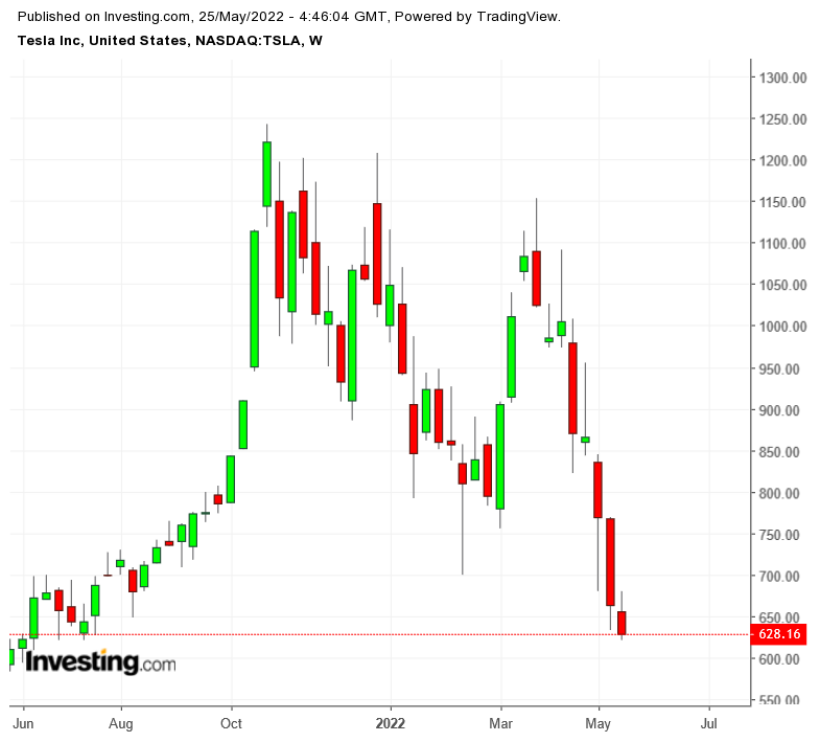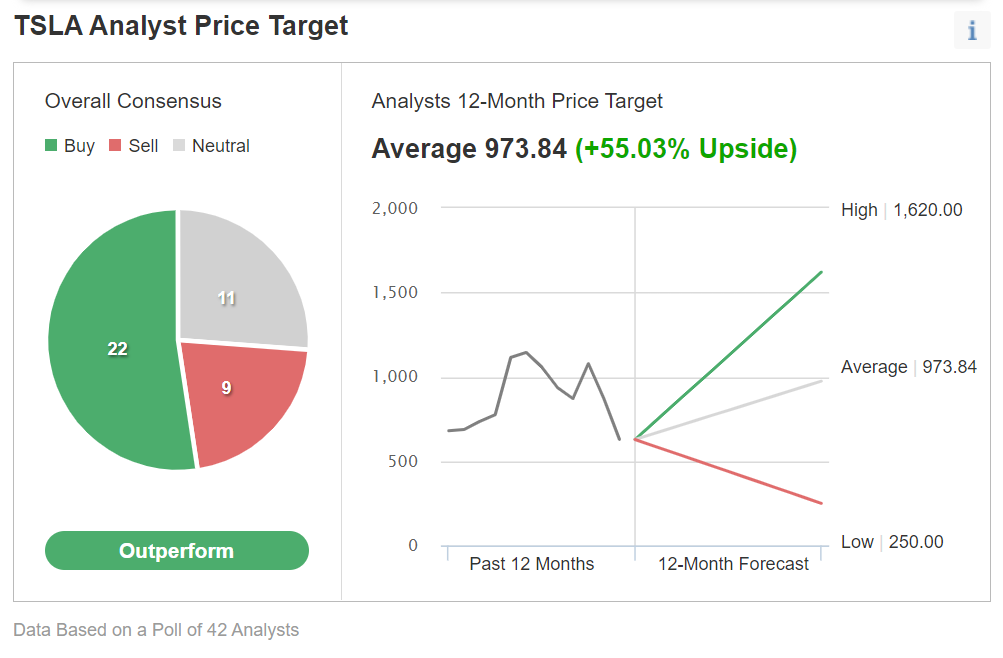- Tesla stock is down more than 40% this year amid a broad-based sell-off in high growth companies
- Analysts warn the carmaker's difficulties in China have become impossible to ignore
- Elon Musk's offer to buy Twitter is also weighing heavily on the stock
Shares of the world's largest electric carmaker, Tesla (NASDAQ:TSLA), have been dropping sharply for more than a month now, closing on Tuesday at $628.16, down almost 7% for the day.

The stock has been hurt by a combination of factors, including a grim macroeconomic outlook, a surge in COVID cases in China, and Elon Musk's pledge to buy Twitter (NYSE:TWTR) in a $44-billion deal.
Unlike last year's corrections, when Tesla managed to rebound quickly, this time seems different. Amid the broad-based sell-off in high-growth companies, losses on Tesla shares—the stock is down more than 47% so far year-to-date—are much steeper than other market heavyweights, such as Apple (NASDAQ:AAPL), which is down more than 20% this year.
Tesla has, so far, successfully navigated current global supply disruptions and soaring raw-material costs more effectively than the competition. It has produced 11 consecutive quarters of profits while consistently beating analysts' production estimates.
However, there are signs that the latest coronavirus outbreak in China, which extended already ongoing lockdowns that led to multiple production disruptions at its factory in Shanghai, will hurt production in the second quarter.
In a recent note, Morgan Stanley analyst Adam Jonas warned that the China supply constraints could potentially drive a "substantial" miss on deliveries in Q2. According to Bloomberg data, analysts' average estimate for Tesla's second-quarter deliveries stands at around 303,000 units, down 12% from the end of March.
Uncertainty Surrounding Twitter Deal
In addition to China's lockdowns and the worsening macroeconomic environment, Elon Musk's involvement in securing favorable terms on Twitter isn't helping either. The billionaire Tesla chief executive recently tweeted that the deal is "on hold" until he gets more information about the portion of the social media platform's users that are spam accounts.
This happened as both Tesla, which Musk relies on for funding the deal, and Twitter stocks tanked. Twitter's board, meanwhile, says it intends to enforce the agreement, which calls for him to pay $54.20 a share. This uncertainty weighs heavily on Tesla investors who worry that Musk will have to sell more of his holdings in the EV company to fund the deal. Adding additional pressure: the agreement also includes a $1 billion "reverse termination fee" that would be triggered if Musk walks away from the deal.
Given the myriad headwinds, Tesla's latest troubles have created a sharp divide among the analyst community regarding the company's stock.
Among 42 analysts polled by Investing.com, though 22 individuals surveyed gave TSLA a buy rating, an almost equal number rated it either a sell or consider it neutral.

Source: Investing.com
Their average 12-month price target of $973.84 indicates a 55.03% upside, but the price range is broad: from a low of $250 to a high of $1,620, a sign of just how uncertain analysts are of the stock's future trajectory.
In a note on Tuesday, Bernstein said it's concerned that Elon Musk's purchase of Twitter could cause Tesla shares to decline yet further. The note said:
"Perhaps the bigger - but less probable - financial risk is that Musk completes the deal, and TSLA's share price declines materially, triggering a margin call."
However, Tesla bulls have a solid reason to stay faithful. Tesla's shares have climbed more than 22,000% since it went public in 2010, providing investors an annual return of 58%. The S&P 500, on the other hand, has returned 373%, including dividends over the same period, averaging 15% a year.
While reiterating Tesla's price as overweight, Piper Sandler said in a note that the stock is still a "cornerstone holding."
"We are cutting our estimates and price target to reflect COVID-related weakness in China, as well as a higher WACC (weighted average cost of capital) assumption in our DCF model. However, we still regard TSLA as a cornerstone holding in any 'advanced mobility' portfolio."
Bottom Line
Any pullback in Tesla shares has proven to be a lucrative trade for dip buyers. But this time looks different, given the multitude of challenges the company faces, including production disruptions in China, a worsening macro environment, and the uncertainty surrounding Musk's Twitter deal.
***
Interested in finding your next great stock or ETF idea? InvestingPro+ gives you the chance to screen through 135K+ stocks to find the fastest growing or most undervalued stocks in the world, with professional data, tools, and insights. Learn More »
